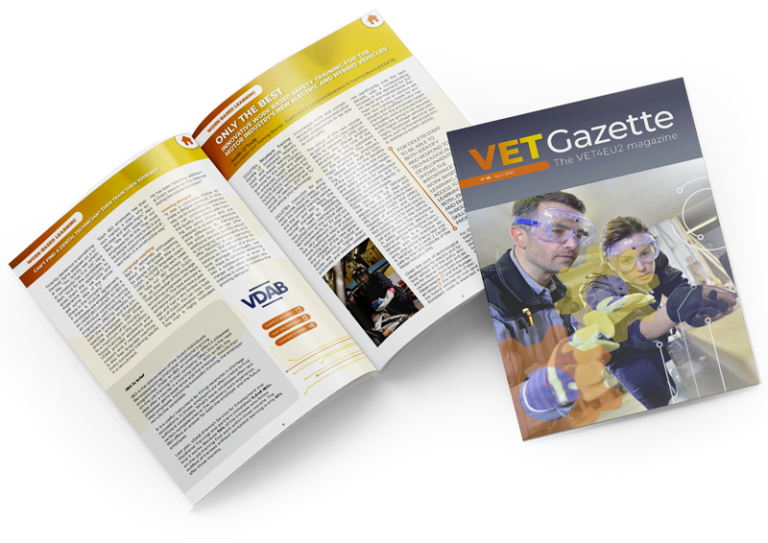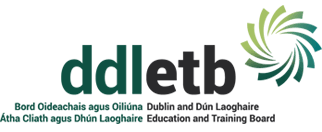Baldoyle Training Centre’s Innovative Work-Based Safety Training For The Motor Industry Electric And Hybrid Vehicles
This is a guest post by Aedin O’Toole. This article first appeared in Vet Gazette.

Vet Gazette Issue 1
DDLETB’s Balydoyle Training Centre successfully developed and delivered Ireland’s first work-based learning programme for the motor industry in enhanced health and safety working practices in electric and hybrid vehicle maintenance, following rapid technological advances in electric (EV) and hybrid vehicle (HV) technology.
DDLETB’s instructor for this new course, David Casey, along with his colleagues Aidan Owens the current training centre manager, and Ken Seery the former manager in Baldoyle, saw the need for upskilling qualified motor mechanics and technicians as the critical safety requirements for EV and HV are very different to older and more traditional ways of motor servicing and repair. In addition, the voltages of the new generation of electric and hybrid vehicles are much higher than previously and require updated knowledge, skills and competences for mechanics and other motor professionals to be able to work safely.
The rollout of this new course as part of Ireland’s new national Skills to Advance (visit STA) programme also offered another advantage, as the cost of the course was heavily subsidised for the employee. This was a major incentive for employers to release their staff for training, in addition to the benefits of the course itself to the workplace, such as enhanced health and safety work practices, decreased potential for workplace accidents or incidents and increasing workforce capacity in EV/HV new technologies.
This new course is delivered over three (3) full days and equips learners with the practical knowledge and skills to identify potential health and safety hazards of electric and hybrid vehicles, component and operation systems and to work safely, minimising risks to the individual and others in the workplace in safely preparing electric or hybrid vehicles for routine maintenance. This is a “hands-on” course, with two practical exams, one online theory test and is certified as a Level 2 Certificate by the UK’s Institute of the Motor Industry (IMI).
Given the pace of technological development for electric and hybrid vehicle and the policy drivers for cleaner transport and decarbonisation from both the Irish Government (visit) and the European Union (visit), the number of electric hybrid vehicles on Irish (and European) roads is expected to rise significantly over the next decade, with a corresponding increase in the demand for EV/HC repair and maintenance. Perhaps what is not so obvious are the new training needs for employers and qualified motor mechanics for the enhanced health and safety work practices that inevitably are going to be required with higher voltage vehicles with highly developed electrical systems, such as the advanced driver assistance system (ADAS).
FOR DDLETB STAFF TO BE ABLE TO BOTH IDENTIFY AND RESPOND TO TECHNOLOGICAL DEVELOPMENTS SHOWS THE IMPORTANCE OF WORK BASED LEARNING, AND ACCESS TO THAT LEARNING BY BOTH, EMPLOYERS AND EMPLOYEES THROUGH THE SKILLS TO ADVANCE PROGRAMME.
It also shows the expertise, foresight and innovation of Ireland’s statutory Education and Training Board (ETB) sector in translating technological developments into the continuous professional development needs of the motor industry, employers, mechanics and technicians.
DDLETB’s Baldoyle Training Centre staff were not the only ones to identify this need. The UK has also been at the forefront in highlighting the potential health and safety risks of rapid technological developments and the need for additional training and in upskilling the motor industry both through the IMI (visit) and the UK’s Health and Safety Executive (visit). Crucially, UK insurance companies (visit) have also recognised the risks and potential liabilities in the industry and allied occupations, such as roadside assistance technicians. Given the implications of Brexit on industry standards, there are new considerations for DDLETB in the development of this course, but also Brexit opportunities, too.
While many car manufacturers have also developed EV/HV training programmes for their own dealerships, many motor industry employers in Ireland, typically small to medium-sized enterprises, are independent, i.e. not franchised to a manufacturer. These employers will need their mechanics and other staff to understand the potential hazards and be able to work safely with this new and rapidly developing technology.
DDLETB’s David Casey explains the potential for the wider European VET and Ireland’s Further Education and Training (FET) sector to lead further developments: “It was important to be able to certify the course as it’s a real achievement for our learners in developing new skills to meet the rapidly changing industry and many of our learners are interested in progressing. So, certification also supports labour market mobility and career development. The IMI was the best certification available to meet this need and also offers progression routes for more advanced qualifications and career progression. While we are planning on delivering the IMI qualification into 2021, it would obviously be better not to have to rely on UK validated qualifications in the longer term. Qualifications that are developed and validated by the Irish or European Qualification Frameworks for the motor industry’s training needs for enhanced health and safety working practices on the new EV and HV technologies would be ideal, post-Brexit.”
DDLETB’s Baldoyle Training Centre has harnessed its industry links with professional and trade organisations, such as the Mechanics Association of Ireland (visit) in marketing and promoting the course. The course has garnered very positive feedback from experienced and qualified motor professionals and employers, who now have a greater appreciation and respect for enhanced health and safety working practices. Tara Mines (visit), one of the companies whose employees participated in the course gave this testimonial: “Thank you for an extremely well put together, interesting course and would highly recommend it to my crew in work and other work colleagues. Hopefully, we can stay in touch and that you will keep me updated on any progress regarding the level 3 course for Electric/Hybrid vehicles. Once again thank you for the excellent level 2 course.”
As David Casey outlines, the course is improving standards in the industry and could potentially avoid injuries or accidents in the workplace: “It’s a practical course and its main aim is to make sure motor professionals can work safely with electric and hybrid vehicles. It’s been great to be able to deliver this course, knowing it could prevent someone from getting hurt in the future.”
Links/hyperlinks from the article:
DDLETB
Baldoyle Training Centre
Skills to Advance
Irish Government’s Climate Action Plan
European Union “Clean Vehicles” Directive Consultation
Institute of Motor Industry
UK Health and Safety Executive
UK Insurance Companies
Mechanics Association of Ireland
Tara Mines






